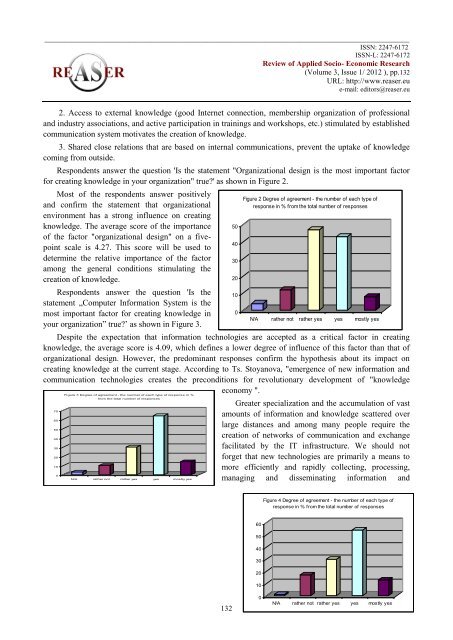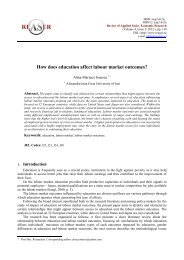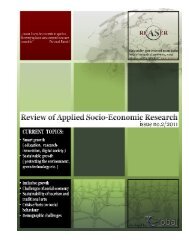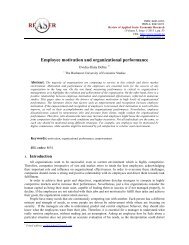Volume 3, ISSUE1/2012 - Review of Applied Socio-Economic ...
Volume 3, ISSUE1/2012 - Review of Applied Socio-Economic ...
Volume 3, ISSUE1/2012 - Review of Applied Socio-Economic ...
You also want an ePaper? Increase the reach of your titles
YUMPU automatically turns print PDFs into web optimized ePapers that Google loves.
________________________________________________________________________________________________<br />
ISSN: 2247-6172<br />
ISSN-L: 2247-6172<br />
<strong>Review</strong> <strong>of</strong> <strong>Applied</strong> <strong>Socio</strong>- <strong>Economic</strong> Research<br />
(<strong>Volume</strong> 3, Issue 1/ <strong>2012</strong> ), pp.132<br />
URL: http://www.reaser.eu<br />
e-mail: editors@reaser.eu<br />
2. Access to external knowledge (good Internet connection, membership organization <strong>of</strong> pr<strong>of</strong>essional<br />
and industry associations, and active participation in trainings and workshops, etc.) stimulated by established<br />
communication system motivates the creation <strong>of</strong> knowledge.<br />
3. Shared close relations that are based on internal communications, prevent the uptake <strong>of</strong> knowledge<br />
coming from outside.<br />
Respondents answer the question 'Is the statement "Organizational design is the most important factor<br />
for creating knowledge in your organization" true?' as shown in Figure 2.<br />
Most <strong>of</strong> the respondents answer positively<br />
and confirm the statement that organizational<br />
environment has a strong influence on creating<br />
knowledge. The average score <strong>of</strong> the importance<br />
<strong>of</strong> the factor "organizational design" on a fivepoint<br />
scale is 4.27. This score will be used to<br />
determine the relative importance <strong>of</strong> the factor<br />
among the general conditions stimulating the<br />
creation <strong>of</strong> knowledge.<br />
Respondents answer the question 'Is the<br />
statement „Computer Information System is the<br />
most important factor for creating knowledge in<br />
your organization” true?’ as shown in Figure 3.<br />
70<br />
60<br />
50<br />
40<br />
30<br />
20<br />
10<br />
0<br />
Figure 3 Degree <strong>of</strong> agreement - the number <strong>of</strong> each type <strong>of</strong> response in %<br />
from the total number <strong>of</strong> responses<br />
N/A rather not rather yes yes mostly yes<br />
50<br />
40<br />
30<br />
20<br />
10<br />
0<br />
Figure 2 Degree <strong>of</strong> agreement - the number <strong>of</strong> each type <strong>of</strong><br />
response in % from the total number <strong>of</strong> responses<br />
N/A rather not rather yes yes mostly yes<br />
Despite the expectation that information technologies are accepted as a critical factor in creating<br />
knowledge, the average score is 4.09, which defines a lower degree <strong>of</strong> influence <strong>of</strong> this factor than that <strong>of</strong><br />
organizational design. However, the predominant responses confirm the hypothesis about its impact on<br />
creating knowledge at the current stage. According to Ts. Stoyanova, "emergence <strong>of</strong> new information and<br />
communication technologies creates the preconditions for revolutionary development <strong>of</strong> "knowledge<br />
economy ".<br />
Greater specialization and the accumulation <strong>of</strong> vast<br />
amounts <strong>of</strong> information and knowledge scattered over<br />
large distances and among many people require the<br />
creation <strong>of</strong> networks <strong>of</strong> communication and exchange<br />
facilitated by the IT infrastructure. We should not<br />
forget that new technologies are primarily a means to<br />
more efficiently and rapidly collecting, processing,<br />
managing and disseminating information and<br />
Figure 4 Degree <strong>of</strong> agreement - the number <strong>of</strong> each type <strong>of</strong><br />
response in % from the total number <strong>of</strong> responses<br />
60<br />
50<br />
40<br />
30<br />
20<br />
10<br />
132<br />
0<br />
N/A rather not rather yes yes mostly yes








